Archive
Archive for the ‘Behavior’ Category

Papa John’s is the latest to call for trust “reconstruction” from the inside out. A quick review of recent news headlines also mentions the EPA after Pruitt, Michigan State’s new athletic director, the Charlottesville police department, Samsung, and Wells Fargo, among others, all calling for trust rebuilding.
At first glance, the obvious recipients of that “first” phone call might be: PR firms and ad agencies, crisis management firms, risk experts, monitors or watchdogs, lawyers or compliance consultants. Yet every one of those choices will result in a “Band-Aid” fix, at best.
For an organization to rebuild trust, the first decision is not who gets the phone call, but who makes it. That first call must originate from the top, and be made to a professional firm with expertise in organizational trust. When that call is delegated to communications, legal or compliance, the chances of obtaining a long-term desired outcome are greatly reduced.
Trust building (and rebuilding) is an intentional holistic exercise. It can’t be pushed down the chain of command and it can only be fixed by the “right” people. Trust can’t be rebuilt with a press conference or an ad campaign, and it does take time.
These 12 Principles called TAP, were developed over the course of a year by a global group of ethics and trust professionals who comprise our Trust Alliance. They are currently available in 14 languages as free PDF downloads and serve as a great starting place and a clear roadmap to building and rebuilding trust. A variety of complimentary tools are also available on our website at trustacrossamerica.com and our Trust Alliance members may also be in a position to help.
Barbara Brooks Kimmel is the CEO and Cofounder of Trust Across America-Trust Around the World whose mission is to help organizations build trust. A former consultant to McKinsey and many Fortune 500 CEOs and their firms, Barbara also runs the world’s largest global Trust Alliance, and is the editor of the award winning TRUST INC. book series and TRUST! Magazine. In 2012 she was named one of “25 Women who are Changing the World” by Good Business International, and in 2017 she became a Fellow of the Governance & Accountability Institute. Barbara holds a BA in International Affairs and an MBA. For more information contact barbara@trustacrossamerica.com
Copyright (c) 2018, Next Decade, Inc.
Barbara Brooks Kimmel, corporate reputation, leadership, Michigan State, organizational trust, Papa John's, trust across america, Trust Inc. Strategies for Building Your Company's Most Valuable Asset, Wells Fargo
Articles written by experts, Behavior, Compliance, culture development, Ethics, Leadership, Professional Development, Risk, TAP INTO TRUST, Trust ResearchMay 30th, 2018
Many models of (un)ethical decision making assume that people decide rationally and are in principle able to evaluate their decisions from a moral point of view. However, people might behave unethically without being aware of it. They are ethically blind.
As organizations are comprised of individuals, Ethical Blindness naturally extends into the workplace. Some business sectors appear to be more ethically blind than others, and this creates enormous enterprise risk. This chart shows the trustworthiness of the major sectors for the Russell 1000 companies based on Trust Across America’s FACTS(R) Framework.
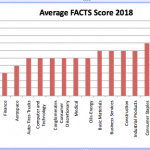
Ethical blindness can be corrected if leaders choose to be “tuned in” to the warning signs described below:
- The Board of Directors does not have established long-term policies or procedures in place to elevate ethical and trustworthy behavior with their internal and external stakeholders. For more information see the Spring Issue of Trust Magazine.
- Leaders, unless they are ethically “aware” by nature, are not proactive about elevating trust or ethics as there is no mandate to do so. When a crisis occurs, the “fix” follows a common “external facing” script involving a costly and unnecessary PR campaign. Wells Fargo’s latest “building trust” television commercial provides a timely example. Meanwhile internally, it’s “business as usual.”
- Discussions of short term gains and cost cutting dominate most group meetings. The pressure to perform is intense and the language used is very strong.
- The Legal and Compliance departments are large and growing faster than any other function.
- The organizational culture is a mystery. No clear “ownership” of ethical or trustworthy business practices or decision-making exist. Think “hot potato.”
- Discussions/training on ethics and trust rarely occur and when they do, they are lead by either the compliance or legal department and focus on rules, not ethics and trust.
- Ethical considerations/testing are not part of the hiring process and fear is widespread among employees.
Is Ethical Blindness at the organizational level fixable? Absolutely. But the first order of business requires leadership acknowledgement and commitment to elevating organizational trust and ethics.
These 12 Principles called TAP, were developed over the course of a year by a group of ethics and trust experts who comprise our Trust Alliance. They should serve as a great starting place for not only a discussion but a clear roadmap to eradicating Ethical Blindness. As a recent TAP commenter said:
An environment /culture that operates within this ethos sounds an awesome place to me , I would work there tomorrow if I knew where to look for it.
Barbara Brooks Kimmel is the CEO and Cofounder of Trust Across America-Trust Around the World whose mission is to help organizations build trust. A former consultant to McKinsey and many Fortune 500 CEOs and their firms, Barbara also runs the world’s largest global Trust Alliance, and is the editor of the award winning TRUST INC. book series and TRUST! Magazine. In 2012 she was named one of “25 Women who are Changing the World” by Good Business International, and in 2017 she became a Fellow of the Governance & Accountability Institute. Barbara holds a BA in International Affairs and an MBA. For more information contact barbara@trustacrossamerica.com
Copyright (c) 2018, Next Decade, Inc.
Barbara Brooks Kimmel, barbara kimmel, Board of Directors, CEO, culture, ethics, FACTS(R), leadership, organizational trust, trust, Trust Inc. 52 Weeks of Activities & Inspirations for Building Workplace Trust, trustworthy behavior

Elevating organizational trust becomes simple once leadership acknowledges the business case. That case has been made repeatedly by many organizations, including ours. Last month we introduced our TAP Principles through the Million Taps Campaign. Each of the 12 statements is designed to open the trust discussion among teams of any size in any organization. (TAP is currently available in 5 languages, with more being added.)
And if you are a leader who wants to build trust into your organization’s DNA, it all begins (and ends) with you. How many of these boxes can you check?
Start with an assessment of yourself:
- Are you trustworthy?
- Do you possess integrity, character and values?
- Do you share those values with your family?
- Do you instill them in your children?
- Do you take your personal values to work?
Perform an organizational trust audit:
- (More information on how to do that can be found in the spring issue of TRUST! Magazine.
- Is it reflected in your statement of values and corporate credo?
- How do you practice your organizational values?
- How well do you communicate them?
- Will they outlive your tenure?
Consider your internal stakeholders:
- Do you discuss trust daily?
- Do you encourage feedback?
- Are you working to break down silos and create unified strategies?
- Do you share a consistent vision?
- Do you model openness and vulnerability?
- Do you use transparent decision-making?
- Do you ask for input?
- Do you share every “Wow” moment in your organization?
- Do you communicate well?
Consider your external stakeholders:
- Have you shared your vision and values in building a trustworthy organization?
- Have you identified the outcome(s) you are seeking?
- Have you defined your intentions for each of our stakeholder groups?
- Have you made promises that you will keep?
- Have you determined the steps you will take to fulfill these promises?
Elevating organizational trust is not difficult. It begins with awareness, acknowledgement of the long-term benefits and a daily commitment to do so.
Barbara Brooks Kimmel is the CEO and Cofounder of Trust Across America-Trust Around the World whose mission is to help organizations build trust. A former consultant to McKinsey and many Fortune 500 CEOs and their firms, Barbara also runs the world’s largest global Trust Alliance, and is the editor of the award winning TRUST INC. book series and TRUST! Magazine. In 2012 she was named one of “25 Women who are Changing the World” by Good Business International, and in 2017 she became a Fellow of the Governance & Accountability Institute. Barbara holds a BA in International Affairs and an MBA.
Copyright (c) 2018, Next Decade, Inc.
Barbara Brooks Kimmel, barbara kimmel, CEO, corporate reputation, culture, FACTS(R), integrity, leadership, organizational trust, trust across america, trust in business, Trust Inc. Strategies for Building Your Company's Most Valuable Asset
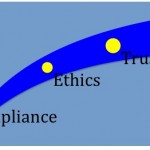
That’s a brash statement, but the facts are the facts. One of the most enlightening moments of my ten-year career leading TAA-TAW came early when a CEO of a large public company said to me “Trust, I never thought about it, but I like that word.” And that statement is why most companies suck at trust.
The daily news discussion of institutional breaches of trust should raise some eyebrows in Boards and C-Suites, but there is little evidence that it does. In public companies, the reasons why are rather simple. The Board and CEO are unwilling to adopt trust-building as a long-term strategy because it may, in the very short-term, impact:
- Quarterly earnings
- Wall Street “guidance”
- Shareholder value
- Their compensation and tenure
And they are not willing to sacrifice any of these, not even for one quarter.
Some other reasons why leaders in both public and private companies, suck at trust may include:
- They were appointed to their position for the wrong reasons. Former fraternity brothers and college lacrosse teammates don’t always make the best CEOs.
- They don’t know what matters to the people they lead, and some simply don’t care.
- Their well-written mission and vision statement is not practiced. We’re committed to the highest standards of integrity, transparency, and principled performance. We do the right thing, in the right way, and hold ourselves accountable. (Wells Fargo Vision and Values)
- Their legal and compliance team sets the ethical barometer, doing only what is “legal” as opposed to what is “right.”
- They believe that crisis repair is less costly than building long-term trust. They will not speak publicly about their organization’s values, ethics, integrity or trust-building until after the breach.
- They have never set aside a budget for trust because it is mistakenly viewed as a soft skill.
Industry is not destiny nor is any company perfect. But when the Board and the CEO suck at trust, the chances are that all the employees will too. That’s too bad for the company, especially since the business case for trust continues to be proven.
If you are a Board member, director or CEO interested in elevating trust in your organization, please read the latest issue of TRUST! Magazine.
If you work in any organization of any size and are interested in elevating trust, please read our recently released global TAP principles. They are now available in 5 languages.
Barbara Brooks Kimmel is the CEO and Cofounder of Trust Across America-Trust Around the World whose mission is to help organizations build trust. A former consultant to McKinsey & Company, she also runs the world’s largest global Trust Alliance and is the editor of the award- winning TRUST INC. book series. In 2017 she was named a Fellow of the Governance & Accountability Institute, and in 2012 she was recognized as one of “25 Women who are Changing the World” by Good Business International. She holds a BA in International Affairs from Lafayette College and an MBA from Baruch at the City University of NY.
For more information visit our website at www.trustacrossamerica.com
or contact barbara@trustacrossamerica.com
Follow us on Twitter @BarbaraKimmel and @TapIntoTrust
You may also join our Constant Contact mailing list for updates on our progress.
Copyright (c) 2018, Next Decade, Inc.
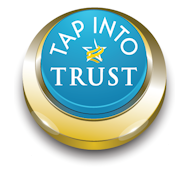 Trust Across America-Trust Around the World continues to reach new milestones in its mission to help organizations build trust.
Trust Across America-Trust Around the World continues to reach new milestones in its mission to help organizations build trust.
Last week we:
- Began our 10th anniversary celebration
- Released the spring issue of TRUST! Magazine whose title is Building Trustworthy Organizations: The Role of Good Governance
- Commenced a movement called TAP INTO TRUST, a set of global Principles to help organizations of any size elevate stakeholder trust.
None of these initiatives would have been possible without collaboration. As our Trust Alliance grows, our members are working side by side to elevate trust in organizations around the world.
If you lead an organization this document will provide the framework to begin the process of elevating trust.
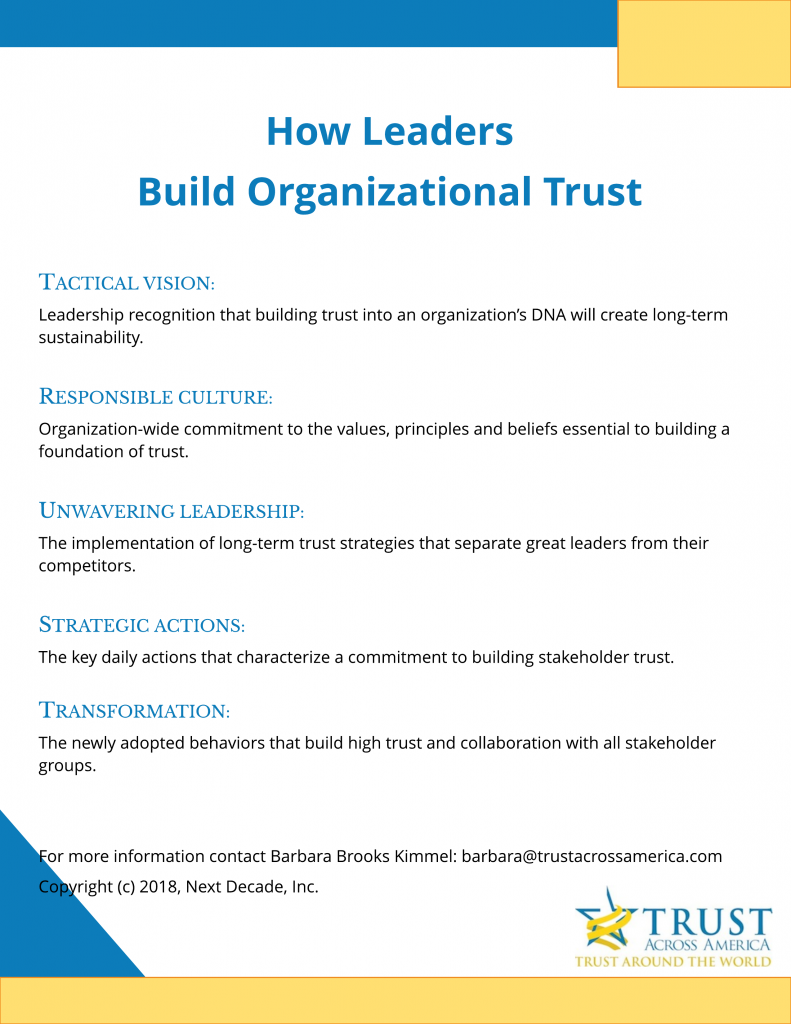
Barbara Brooks Kimmel is the CEO and Cofounder of Trust Across America-Trust Around the World whose mission is to help organizations build trust. A former consultant to McKinsey & Company, she also runs the world’s largest global Trust Alliance and is the editor of the award- winning TRUST INC. book series. In 2017 she was named a Fellow of the Governance & Accountability Institute, and in 2012 she was recognized as one of “25 Women who are Changing the World” by Good Business International. She holds a BA in International Affairs from Lafayette College and an MBA from Baruch at the City University of NY.
For more information visit our website at www.trustacrossamerica.com
or contact barbara@trustacrossamerica.com
Follow us on Twitter @BarbaraKimmel and @TapIntoTrust
You may also join our Constant Contact mailing list for updates on our progress.
Copyright (c) 2018, Next Decade, Inc.
Barbara Brooks Kimmel, barbara kimmel, CSR, culture, leadership, organizational trust, reputation, trust across america, Trust Inc. 52 Weeks of Activities & Inspirations for Building Workplace Trust, Trust Inc. Strategies for Building Your Company's Most Valuable Asset

Did Mark Zuckerberg breach trust?
Facebook won the “breach of trust award” last week, but was it justified?
If you are a Facebook user, have you read the company’s data policy? Perhaps doing so would have elevated your awareness of the risks involved in using this popular social media tool.
Have you ever taken one of those free “silly” Facebook quizzes? Did you think they were being provided for your amusement, especially in cases where the user was paid to complete it?
A recent opinion piece in the Washington Post raised the following points?
Those who enter the ecosystem of social networking should not suddenly be shocked that information is being shared.
This transfer of data to a third party (Cambridge Analytica) broke Facebook’s internal policies. In 2015, Facebook found out, removed the app and demanded the data be destroyed.
However, users must be realistic. Social media platforms are in business to share. Anyone who spends time browsing online will soon discover hidden sinews that connect each click.
The Washington Post article can be read at this link.
I’m all for elevating trust and the first to admit that this example has me thinking twice. Did Facebook make mistakes by not ensuring that the data was destroyed. Yes. But perhaps this was as much a learning experience for Mark Zuckerberg as it was for Facebook users. After all, no company (or leader) is perfect. Understanding the risks, maybe too much trust was extended by Facebook’s users.
Did Zuckerberg breach trust? What do you think?
Barbara Brooks Kimmel is the CEO and Cofounder of Trust Across America-Trust Around the World whose mission is to help organizations build trust. A former consultant to McKinsey & Company, she also runs the world’s largest global Trust Alliance and is the editor of the award- winning TRUST INC. book series. In 2017 she was named a Fellow of the Governance & Accountability Institute, and in 2012 she was recognized as one of “25 Women who are Changing the World” by Good Business International. She holds a BA in International Affairs from Lafayette College and an MBA from Baruch at the City University of NY.
For more information visit our website at www.trustacrossamerica.com
or contact barbara@trustacrossamerica.com
You may also join our Constant Contact mailing list for updates on our progress.
Copyright (c) 2018, Next Decade, Inc.
Barbara Brooks Kimmel, Facebook, integrity, leadership, organizational trust

Have you noticed that as LinkedIn has grown, the user focus has shifted away from relationship building to individual advertising? I don’t know about you, but sometimes I feel like I am rowing alone in a sea, and it’s not the Caribbean.
As a LinkedIn user, have you considered the benefits of first building trust with your connections? After all, LinkedIn is a great way to develop relationships that may lead to new business or collaborative opportunities down the road. Under the theory that trust is built over time and in incremental steps consider adjusting your LinkedIn “strategy” using some of the following trust-building suggestions.
Connecting
- Before accepting a new connection, take a minute to view the profile of the party who is reaching out. If there are no clear personal or professional synergies, consider passing on the invitation.
- When accepting, send a note indicating that you have spent a few minutes reviewing the profile to get to know the new connection. Ask whether the other party had a specific reason for wanting to connect.
- When sending an invitation, add a personal note showing some level of interest in the work of the potential new relationship.
Posting
- First consider the usefulness to your connections of your next post. Are you posting for your benefit or for theirs? Cheap advertising isn’t always the best marketing strategy! (Same goes for posting to groups.)
- Drop the insincere platitudes like “honored and humbled” when trumpting your minor successes. Save those words for the appropriate occasion.
- Review your past posts. How many times do you use the words “Me, my, I?”
- Don’t forget to acknowledge every comment on your post and also to reciprocate.
Networking
- Periodically review connections and send a note to those who you might want to get to know better.
- If you haven’t had any interaction beyond the first connection, never send a private message that is nothing more than an advertisement (usually an invitation to attend an event that involves paying a fee.)
- Do not use your connections to create a mailing list. Ask for permission first.
What other suggestions do you have for building trust on LinkedIn? Please leave your comments below.
Barbara Brooks Kimmel is the CEO and Cofounder of Trust Across America-Trust Around the World whose mission is to help organizations build trust. A former consultant to McKinsey & Company, she also runs the world’s largest global Trust Alliance and is the editor of the award- winning TRUST INC. book series. In 2017 she was named a Fellow of the Governance & Accountability Institute, and in 2012 she was recognized as one of “25 Women who are Changing the World” by Good Business International. She holds a BA in International Affairs from Lafayette College and an MBA from Baruch at the City University of NY.
For more information visit our website at www.trustacrossamerica.com
You may also join our Constant Contact mailing list for updates on our progress.
Copyright (c) 2018, Next Decade, Inc.
Barbara Brooks Kimmel, barbara kimmel, trust, trust across america, trustworthy behavior
The other day I was speaking with someone who is not familiar with my professional work. He told me that his company is asking all employees to complete an anonymous “satisfaction” survey, and now blasting email reminders to those who have not yet filled out the online questionnaire. I asked what was holding him back. His response… “I doubt it’s anonymous and I will NOT be honest for fear of losing my job. My colleagues are also nervous about how to handle this.”
I know a bit about this company since two generations of my family have used their services and watched their evolution from a “one man shop” in the 1960s. At one time my dad and the founder of the company used to “talk shop” in our garage. Fast-forward and the company is now a 50+ year-old family business in residential and commercial services with well over 100 employees. They have been acquiring competitors at a fast pace and had their “best year” in 2017. The founder is now retired and management (primarily family and family of family) has all worked their way up through the trenches.
From my customer perspective:
- Main office customer service is declining, with an emphasis on charges, not service
- The skill level of technicians is no longer consistent
- Up selling during service visits is increasing
- Prices have skyrocketed
Back to my conversation with the employee… I asked whether his manager had ever attempted to obtain the same “survey” information through any other means like face-to-face discussions, team conversations, workshops or professional development? He laughed and replied that such actions would surely result in fistfights, so “No.”
I pressed further. Why would fights break out? He responded with a list of reasons:
- Management plays favorites
- Demands on employees are unrealistic and uneven
- Politics runs rampant
- Lots of jerks in the room
- Nobody trusts anybody else
So what’s really happening here? Without any additional information I would point to lack of competent leadership, which has resulted in a culture of distrust. It’s one thing to run a small “mom and pop shop” and quite another to manage several acquisitions, rapid growth and on boarding of large numbers of new employees. Just because a person may be “family” doesn’t mean they are “cut out of the leadership cloth.”
Employee satisfaction surveys will do little to help this company except perhaps bolster management egos, and maybe provide some advertising “bragging rights” if all the employees exaggerate their responses for fear of job loss.
I wish this were a unique story. Is it?
Am I correct in my assessment of the “real” problem?
What should be done differently?
Barbara Brooks Kimmel is the CEO and Cofounder of Trust Across America-Trust Around the World whose mission is to help organizations build trust. A former consultant to McKinsey & Co., she also runs the world’s largest global Trust Alliance and is the editor of the award- winning TRUST INC. book series. In 2017 she was named a Fellow of the Governance & Accountability Institute, and in 2012 she was recognized as one of “25 Women who are Changing the World” by Good Business International. She holds a BA in International Affairs from Lafayette College and an MBA from Baruch at the City University of NY.
Join our Constant Contact mailing list for updates on our progress.
Contact me for more information.

Purchase our books at this link
Copyright 2018 Next Decade, Inc.
Barbara Brooks Kimmel, barbara kimmel, culture, leadership, organizational trust
According to this recent article from the Stanford Social Innovation Review, 9 out of 10 consumers want to make purchases that reflect their values. If trust is an important value to you, read on.
In 2010 Trust Across America introduced the FACTS® Framework, a holistic unbiased barometer of the corporate integrity of America’s largest 2000 US public companies. The Framework identifies companies whose leadership is going beyond doing what is legal to choosing what is right in meeting all stakeholder needs. This, by order of magnitude, is the most comprehensive and data driven ongoing study on this subject. We analyze quarterly and rank order by company, sector and market capitalization. We are particularly interested in tracking individual companies and sector trends over time.
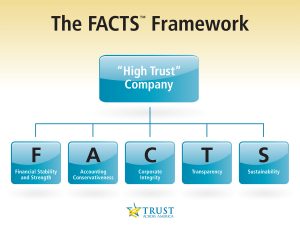
Understanding that brick and mortar retailers face increasing challenges, we took a closer look at how some retailers stack up in our Trust Metrics. These are our findings.
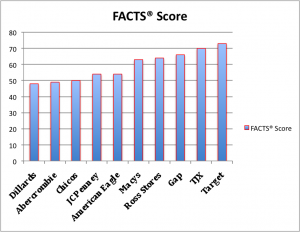
This chart reflects 5-year average (2012-2017) scores of corporate trustworthiness. Trust Across America will be completing its 2018 analysis in April. Given this knowledge, I might choose TJX and Target over Dillard’s and Abercrombie. How about you?
Barbara Brooks Kimmel is the CEO and Cofounder of Trust Across America-Trust Around the World whose mission is to help organizations build trust. A former consultant to McKinsey & Co., she also runs the world’s largest global Trust Alliance and is the editor of the award- winning TRUST INC. book series. In 2017 she was named a Fellow of the Governance & Accountability Institute, and in 2012 she was recognized as one of “25 Women who are Changing the World” by Good Business International. She holds a BA in International Affairs from Lafayette College and an MBA from Baruch at the City University of NY.
Join our Constant Contact mailing list for updates on our progress.
Contact me for more information.
Copyright 2018 Next Decade, Inc.
Barbara Brooks Kimmel, barbara kimmel, corporate reputation, organizational trust, trust across america, values

Trust is not a soft skill, nor should it be taken for granted. It is a tangible asset that impacts the bottom line.
Last week’s blog post discussed the various ways that low trust can kill an organization. So how can trust be elevated? We asked our Trust Alliance members to weigh in and the following are some “best practices” for building organizational trust.
- First identify what builds trust and what breaks trust. Bob Vanourek
- Agree on core values, then practice and reinforce them daily. Barbara Brooks Kimmel
- Build cultures of commitment vs. compliance where choices are guided by values, not policies. Mark Fernandes
- Work tirelessly to dispel the illusion that trust is a soft skill. Doug Conant
- Be a role model. Charlie Green
- Be inclusive in your decision-making process. Nadine Hack
- Set intentional promises and expectations on what you will deliver to all stakeholders. David Reiling
- Go public when expressing gratitude; go private when expressing disappointment. Holly Latty-Mann
- Presume good intentions. Bart Alexander
- In every interaction with every person, ask yourself “What can I do in this moment to strengthen the trust between us?” Jim Kouzes
Our growing global Trust Alliance is working to build tools to help organizations of all sizes and shapes build trust. What’s stopping you from joining?
Barbara Brooks Kimmel is the CEO and Cofounder of Trust Across America-Trust Around the World whose mission is to help organizations build trust. A former consultant to McKinsey & Co., she also runs the world’s largest global Trust Alliance and is the editor of the award- winning TRUST INC. book series. In 2017 she was named a Fellow of the Governance & Accountability Institute, and in 2012 she was recognized as one of “25 Women who are Changing the World” by Good Business International. She holds a BA in International Affairs from Lafayette College and an MBA from Baruch at the City University of NY.
Join our Constant Contact mailing list for updates on our progress.
Copyright 2018 Next Decade, Inc.
Barbara Brooks Kimmel, barbara kimmel, culture, integrity, leadership, organizational trust, trust across america, Trust Alliance












Recent Comments